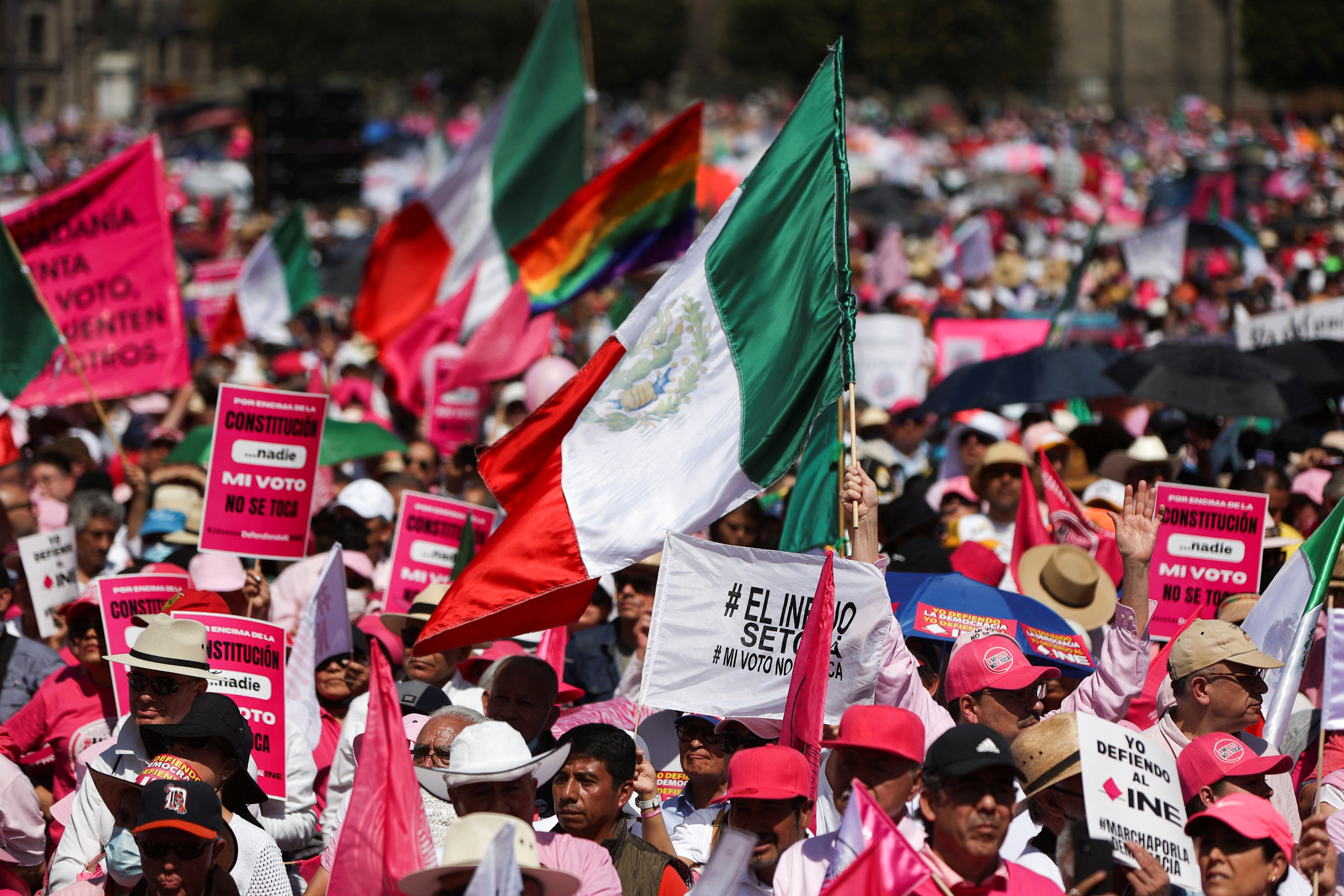Are you curious about who won the recent elections in Mexico? Gaymexico.net is here to give you a detailed analysis of the election outcomes, focusing on the impact on the LGBTQ+ community and Mexico’s future. Discover how the results might affect LGBTQ+ rights, tourism, and social progress in Mexico.
1. What Were the Key Outcomes of the Mexico Election?
Claudia Sheinbaum of the Morena party emerged as the winner of the Mexican presidential election. She secured nearly 60% of the popular vote, marking a significant victory. This win makes her the first female president of Mexico and signals a continuation of the “Fourth Transformation” policies initiated by her predecessor, Andrés Manuel López Obrador.
Sheinbaum’s victory also means that the Morena party, in coalition with the Green Party and Workers’ Party, has gained a strong hold on the Mexican Congress. They now control two-thirds of the seats in the Chamber of Deputies and are just a few votes short of a supermajority in the Senate. This level of control could allow for significant constitutional reforms.
2. How Will the Election Results Affect LGBTQ+ Rights in Mexico?
The impact of the election results on LGBTQ+ rights in Mexico is a key concern for many. Sheinbaum has generally expressed support for LGBTQ+ rights, including marriage equality and gender identity recognition.
During her tenure as mayor of Mexico City, she implemented policies promoting LGBTQ+ inclusion and protection. However, the Morena party’s stance on LGBTQ+ issues has been mixed, with some members holding more conservative views.
According to Human Rights Watch, while Mexico has made progress in LGBTQ+ rights, challenges remain, particularly in regions with strong religious or traditional influences.
 Claudia Sheinbaum LGBTQ+ Pride Parade
Claudia Sheinbaum LGBTQ+ Pride Parade
Alt text: Claudia Sheinbaum participating in an LGBTQ+ Pride Parade in Mexico City, demonstrating her support for LGBTQ+ rights.
Potential Advances:
- National-Level Protections: With Morena’s strong congressional presence, there could be increased momentum for passing national laws protecting LGBTQ+ individuals from discrimination and hate crimes.
- Marriage Equality Expansion: While many states in Mexico have legalized same-sex marriage, a national law would ensure equal rights for all LGBTQ+ couples across the country.
- Transgender Rights: Further advancements in gender identity recognition and access to healthcare for transgender individuals are possible under Sheinbaum’s leadership.
Challenges:
- Social Conservatism: Opposition from socially conservative groups could hinder progress on LGBTQ+ rights.
- Regional Disparities: Enforcement of LGBTQ+ rights may vary significantly across different states due to cultural and political differences.
- Violence and Discrimination: Addressing the ongoing violence and discrimination against LGBTQ+ individuals remains a critical challenge.
3. What Does Sheinbaum’s Victory Mean for Tourism in Mexico, Especially for the LGBTQ+ Community?
Sheinbaum’s victory could have positive implications for tourism in Mexico, particularly for the LGBTQ+ community. As a progressive leader, she is likely to promote Mexico as a welcoming and inclusive destination for all travelers.
Mexico already has several popular LGBTQ+-friendly destinations, such as Puerto Vallarta, Mexico City, and Cancun. These cities offer a vibrant LGBTQ+ scene with gay bars, clubs, hotels, and cultural events.
Potential Benefits:
- Increased LGBTQ+ Tourism: Sheinbaum’s policies and public statements could attract more LGBTQ+ tourists to Mexico.
- Promotion of LGBTQ+-Friendly Destinations: The government may invest in promoting LGBTQ+-friendly destinations and events, further enhancing Mexico’s appeal to this market.
- Safer Travel Environment: Efforts to combat discrimination and violence against LGBTQ+ individuals could create a safer and more welcoming travel environment.
Considerations:
- Safety Concerns: While many areas in Mexico are safe for LGBTQ+ travelers, it is essential to be aware of potential risks and take necessary precautions.
- Cultural Sensitivity: Respecting local customs and traditions is crucial when traveling in Mexico, particularly in more conservative regions.
- Access to Information: Having access to reliable information about LGBTQ+-friendly venues and resources is essential for a positive travel experience.
Gaymexico.net offers comprehensive travel guides, event listings, and community resources to help LGBTQ+ travelers plan their trips to Mexico.
4. How Did Organized Crime Influence the Mexico Election?
Organized crime played a disturbing role in the Mexico election, marking a concerning trend in the country’s political landscape. According to the Electoral Laboratory, there were 320 documented attacks against politicians, including 93 murders, with 37 candidates and likely contenders among the deceased. These figures surpass the levels of violence seen in previous elections, such as 2021 and 2018.
The states most affected by election-related violence were those with high levels of organized crime activity, including Chiapas, Guerrero, Jalisco, Michoacán, Morelos, and the State of Mexico. In these areas, criminal groups used assassinations and bribery to influence the election outcomes.
Methods of Influence:
- Assassinations: Eliminating rival candidates to pave the way for preferred candidates.
- Bribery: Offering financial incentives to politicians and election officials to ensure favorable results.
- Intimidation: Threatening voters and election workers to manipulate voting choices.
- Candidate Selection: Actively promoting and supporting candidates aligned with their interests.
The increasing involvement of organized crime in Mexican politics poses a significant threat to democracy and the rule of law. It undermines the integrity of elections and allows criminal groups to exert control over local governance.
5. What Constitutional Reforms Are Being Proposed, and How Could They Affect Mexico’s Democracy?
Outgoing President López Obrador has proposed 20 major reforms, many of which require constitutional changes. These reforms cover a wide range of issues, from healthcare and pension reform to fundamental institutional design. Some of the most contentious proposals include:
- Elimination of Proportional Representation: This could reduce the diversity of voices in Congress and concentrate power in the hands of the ruling party.
- Dissolution or Restructuring of Regulatory Agencies: Weakening independent regulatory bodies could lead to corruption and reduced accountability.
- Transfer of Control of the National Guard to the Military: Militarizing law enforcement could lead to human rights abuses and further erosion of civilian control.
- Popular Election of Supreme Court Justices: Politicizing the judiciary could compromise its independence and impartiality.
According to experts at the Wilson Center, these reforms threaten to dismantle checks and balances and undermine Mexico’s democratic institutions.
Potential Impacts:
- Weakening of Independent Institutions: Reducing the power and autonomy of regulatory agencies and electoral bodies.
- Increased Militarization: Giving the military greater control over law enforcement and public policy.
- Erosion of Judicial Independence: Politicizing the judiciary and undermining its ability to hold the government accountable.
- Concentration of Power: Consolidating power in the hands of the executive branch and the ruling party.
6. What Is the “Fourth Transformation,” and Will Sheinbaum Continue It?
The “Fourth Transformation” (Cuarta Transformación or 4T) is a social and political restructuring of Mexico initiated by President López Obrador. It aims to economically empower the country’s poor and marginalized populations while addressing historical injustices and inequalities.
Sheinbaum has pledged to continue the 4T agenda, which includes:
- Social Welfare Programs: Expanding access to education, healthcare, and social security for vulnerable groups.
- Anti-Corruption Measures: Combating corruption and promoting transparency in government.
- Economic Nationalism: Prioritizing domestic industries and reducing reliance on foreign investment.
- Strengthening State Control: Increasing government intervention in key sectors of the economy.
Potential Benefits:
- Poverty Reduction: Lifting millions of Mexicans out of poverty and improving living standards for marginalized communities.
- Reduced Inequality: Narrowing the gap between the rich and poor and promoting social mobility.
- Greater Social Inclusion: Empowering marginalized groups and promoting their participation in society.
Potential Challenges:
- Economic Sustainability: Ensuring that social welfare programs are financially sustainable in the long term.
- Impact on Investment: Addressing concerns about economic nationalism and its impact on foreign investment.
- Democratic Concerns: Safeguarding democratic institutions and protecting civil liberties amidst social and political changes.
7. How Does Sheinbaum’s Approach Differ from López Obrador’s, Especially Regarding Organized Crime?
While Sheinbaum has expressed her commitment to continuing the 4T agenda, her approach may differ from López Obrador’s in certain areas, particularly regarding organized crime. López Obrador adopted a non-confrontational approach, hoping that by not directly engaging with criminal groups, violence would decrease. However, this strategy has been widely criticized for its lack of effectiveness.
Sheinbaum has signaled a potential shift towards a more proactive approach to combating organized crime. During her tenure as mayor of Mexico City, she implemented strategies to reduce crime rates and improve public safety.
Potential Differences:
- More Active Law Enforcement: Strengthening law enforcement agencies and increasing their capacity to combat organized crime.
- Intelligence Gathering: Improving intelligence gathering and analysis to identify and disrupt criminal networks.
- Community Engagement: Working with local communities to build trust and support for law enforcement efforts.
- Addressing Root Causes: Tackling the underlying social and economic factors that contribute to crime, such as poverty and inequality.
It remains to be seen how Sheinbaum’s approach to organized crime will evolve once she takes office. However, her past record suggests a willingness to adopt more proactive and comprehensive strategies to address this critical issue.
8. What Role Will López Obrador Play After Leaving Office?
López Obrador’s continuing influence over the Morena party means he could potentially exert influence over Sheinbaum’s rule, especially concerning policy control.
In three years, Sheinbaum might face a recall referendum, a process that López Obrador created and manipulated to his advantage. This referendum allows the removal of a sitting president from office if citizens request it and 3 million signatures are collected. Given his charisma and political power, López Obrador could use the process to clip any impulses Sheinbaum may develop to deviate from his preferred policies.
 Andrés Manuel López Obrador and Claudia Sheinbaum
Andrés Manuel López Obrador and Claudia Sheinbaum
Alt text: Andrés Manuel López Obrador and Claudia Sheinbaum at a political rally, highlighting their close relationship.
9. How Did the “Primaries” Affect Mexico’s Party System?
The “primaries,” novel in Mexico where political parties had predominantly relied on closed-door methods to anoint party leaders and candidates, gave the selection of top politicians badly needed transparency and a popular mandate. But the absence of formal regulations and Mexican political parties’ widespread disregard for electoral authorities during the primaries also highlighted Mexico’s perpetual and defining problem: the lack of rule of law. Moreover, the primaries exacerbated party divisions in an already highly polarized country.
The elections cemented the reconfiguration of Mexico’s party system. Morena, a 2014 newcomer, consolidated its supremacy, thanks to its redistribution policies and López Obrador’s charisma. It again managed to attract new voters as well as new party operatives. Morena’s coattails also helped the traditionally weak Green Party, catapulting it to the second-strongest party in the Chamber of Deputies.
10. What Challenges Does Sheinbaum Face in Controlling Morena?
While Morena’s success endows Sheinbaum with awesome power, it may also turn out to be her biggest challenge. The first issue is whether Sheinbaum will manage to control the disparate and fractious Morena, a hodgepodge of political opportunists with widely differing agendas.
The second issue is her mentor. Because of his continuing influence over Morena, López Obrador may cast more than a shadow over Sheinbaum’s rule if he seeks policy control. Most tangibly, in three years, Sheinbaum might face a recall referendum, a process that López Obrador created and manipulated to his advantage. This referendum allows the removal of a sitting president from office if citizens request it and 3 million signatures are collected. Given his charisma and political power, López Obrador could use the process to clip any impulses Sheinbaum may develop to deviate from his preferred policies.
FAQ: Mexico Election and Its Implications
1. Who won the Mexico election 2024?
Claudia Sheinbaum of the Morena party won the Mexico presidential election in 2024. She is the first woman president of Mexico.
2. How will the new president impact LGBTQ+ rights in Mexico?
Sheinbaum is expected to support and potentially advance LGBTQ+ rights, building on existing progress with possible national-level protections and expanded marriage equality.
3. What are the best LGBTQ+-friendly travel destinations in Mexico?
Popular destinations include Puerto Vallarta, Mexico City, and Cancun, known for their vibrant LGBTQ+ scenes and welcoming atmosphere.
4. How did organized crime affect the election results?
Organized crime influenced the election through violence, intimidation, and bribery, affecting candidate selection and voter choices in several states.
5. What are the key constitutional reforms being proposed?
Reforms include eliminating proportional representation in Congress, restructuring regulatory agencies, and transferring control of the National Guard to the military, raising concerns about democratic checks and balances.
6. What is the “Fourth Transformation” that Sheinbaum is expected to continue?
The “Fourth Transformation” is a social and political restructuring aimed at empowering marginalized populations, combating corruption, and increasing state control in key sectors.
7. How might Sheinbaum’s approach to organized crime differ from her predecessor’s?
Sheinbaum may adopt a more proactive approach with stronger law enforcement, intelligence gathering, and community engagement to combat criminal networks.
8. What role will López Obrador play after Sheinbaum takes office?
López Obrador’s continuing influence could impact Sheinbaum’s policy decisions, and she may face a recall referendum if she deviates from his preferred policies.
9. What was the impact of the primary elections on the established parties in Mexico?
The primary elections highlighted issues with the rule of law and exacerbated party divisions, leading to a reconfiguration of Mexico’s party system with Morena consolidating its power.
10. How does the US presidential election influence Mexican politics and policy?
The US presidential election can significantly influence Mexican politics and policy, particularly in areas such as trade, immigration, and security cooperation.
Conclusion: Navigating Mexico’s Future with Confidence
The 2024 Mexico election has brought significant changes and challenges to the country. Claudia Sheinbaum’s victory presents opportunities for advancing LGBTQ+ rights, promoting tourism, and addressing social inequalities. However, the influence of organized crime and the potential for democratic backsliding remain critical concerns.
Stay informed and connected with gaymexico.net for the latest updates, travel guides, and community resources. Whether you’re planning a trip to Mexico or seeking to connect with the LGBTQ+ community, we’re here to help you navigate Mexico’s future with confidence.
Explore Mexico with Gaymexico.net:
- LGBTQ+ Travel Guides: Discover the best destinations and hidden gems in Mexico.
- Event Listings: Find LGBTQ+ events and festivals happening throughout the year.
- Community Resources: Connect with local organizations and support networks.
Address: 3255 Wilshire Blvd, Los Angeles, CA 90010, United States
Phone: +1 (213) 380-2177
Website: gaymexico.net
Call to Action: Visit gaymexico.net today to explore our comprehensive travel guides, find upcoming events, and connect with the LGBTQ+ community in Mexico. Plan your next adventure with confidence and discover the beauty and diversity of Mexico!
